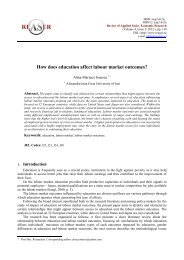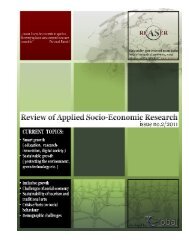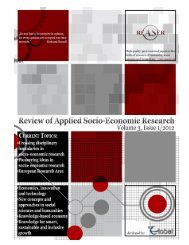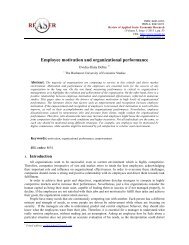new characteristics of inequalities in the information society and ...
new characteristics of inequalities in the information society and ...
new characteristics of inequalities in the information society and ...
Create successful ePaper yourself
Turn your PDF publications into a flip-book with our unique Google optimized e-Paper software.
ISSN: 2247-6172;<br />
ISSN-L: 2247-6172<br />
Review <strong>of</strong> Applied Socio- Economic Research<br />
(Volume 5, Issue 1/ 2013), pp. 27<br />
URL: http://www.reaser.eu<br />
e-mail: editors@reaser.eu<br />
Never<strong>the</strong>less each country followed a different pattern depend<strong>in</strong>g on <strong>the</strong> ability <strong>of</strong> Catholic<br />
<strong>in</strong>stitutions to adapt to modernization <strong>and</strong> on <strong>the</strong> level <strong>of</strong> development. For <strong>in</strong>stance, <strong>in</strong> <strong>the</strong> sixties<br />
Chile was characterized by both a sufficiently high development level <strong>and</strong> accord<strong>in</strong>g to Vallier<br />
(1970) a high propensity <strong>of</strong> Catholic Church to change with modernization – high . O<strong>the</strong>r<br />
countries like Mexico <strong>and</strong> Argent<strong>in</strong>a though present<strong>in</strong>g <strong>the</strong> same level <strong>of</strong> <strong>in</strong>dustrialization as <strong>in</strong><br />
Chile had more conservative Catholic <strong>in</strong>stitutions. In <strong>the</strong> latter case as <strong>the</strong> development level was<br />
coupled with a low , it was not so high as to dissem<strong>in</strong>ate modern values. In fact, <strong>in</strong> Chile <strong>the</strong><br />
strength <strong>of</strong> political <strong>in</strong>stitutions allowed for <strong>the</strong> separation between religion <strong>and</strong> secular power.<br />
Moreover <strong>the</strong>re was <strong>the</strong> competitive pressure <strong>of</strong> <strong>the</strong> communist party <strong>and</strong> Pentecostals more<br />
responsive to <strong>the</strong> claims for change <strong>of</strong> <strong>society</strong> <strong>in</strong> <strong>the</strong> access to <strong>and</strong> distribution <strong>of</strong> resources. All<br />
<strong>the</strong>se factors, on <strong>the</strong> one h<strong>and</strong>, freed political <strong>and</strong> social organizations from <strong>the</strong> control <strong>of</strong> <strong>the</strong><br />
Catholic Church, <strong>in</strong>clud<strong>in</strong>g <strong>the</strong> cultural control <strong>of</strong> education. On <strong>the</strong> o<strong>the</strong>r h<strong>and</strong>, <strong>the</strong>y stimulated<br />
Chilean religious <strong>in</strong>stitutions to back <strong>the</strong> secular goals pursued by political <strong>in</strong>stitutions. Instead, <strong>in</strong><br />
Mexico though <strong>the</strong>re was a clear-cut separation between state <strong>and</strong> religion from <strong>the</strong> beg<strong>in</strong>n<strong>in</strong>g <strong>of</strong><br />
<strong>the</strong> twentieth century, <strong>the</strong> Church kept a traditional <strong>and</strong> conservative role as far as social needs<br />
were concerned. It did not receive enough stimuli from governmental <strong>in</strong>stitutions, from compet<strong>in</strong>g<br />
political <strong>and</strong> religious movement <strong>in</strong> order to fur<strong>the</strong>r modernization – low . Differently, <strong>in</strong><br />
Argent<strong>in</strong>a <strong>the</strong> weakness <strong>and</strong> <strong>in</strong>stability <strong>of</strong> political <strong>in</strong>stitutions allowed for <strong>the</strong> <strong>in</strong>fluence <strong>of</strong> Catholic<br />
<strong>in</strong>stitutions <strong>in</strong> some spheres <strong>of</strong> political power. Such impact, traditionally conservative <strong>and</strong> contrary<br />
to modernizations, was streng<strong>the</strong>ned by <strong>the</strong> lack <strong>of</strong> competition by o<strong>the</strong>r political <strong>and</strong> religious<br />
movements. By this token Catholic <strong>in</strong>stitutions were not responsive at all to <strong>the</strong> claims for social<br />
change dictated by <strong>the</strong> modernization process – low . In light <strong>of</strong> our evidence <strong>and</strong> <strong>of</strong> <strong>the</strong>se<br />
historical patterns described by Vallier (1970), it is not mistaken to hold that overall <strong>in</strong> <strong>the</strong> Lat<strong>in</strong><br />
American countries where <strong>the</strong>re have been high development <strong>and</strong> modernization along with <strong>the</strong><br />
ability <strong>of</strong> Catholic <strong>in</strong>stitutions to adapt to modernization, Catholic religion has been able to follow<br />
<strong>the</strong> cultural changes <strong>in</strong>duced by modernization. Thus, it has transmitted values foster<strong>in</strong>g higher<br />
educational achievements. While whenever <strong>the</strong>re has been a strong resistence to change by<br />
religious <strong>in</strong>stitutions, it has been necessary a development level sufficiently high to overcome<br />
religious conservatism <strong>and</strong> to promote chang<strong>in</strong>g values, which has not always been <strong>the</strong> case.<br />
5. Conclusions<br />
Accord<strong>in</strong>g to our <strong>the</strong>oretical approach, religious values <strong>in</strong>fluence children’s attitudes <strong>and</strong><br />
motivations towards education by emphasiz<strong>in</strong>g <strong>the</strong> importance <strong>of</strong> school performance <strong>and</strong><br />
educational achievements. Any type <strong>of</strong> religion <strong>in</strong>dependently <strong>of</strong> its conservative dimension can<br />
promote hard work, discipl<strong>in</strong>e <strong>and</strong> responsibility. However religion may present a conservative<br />
dimension which promotes <strong>the</strong> acceptance <strong>of</strong> <strong>the</strong> status quo <strong>and</strong> hampers <strong>in</strong>dividual selfdeterm<strong>in</strong>ation.<br />
Religious conservatism can shape children’s attitude <strong>in</strong> such a way that <strong>the</strong>y do not<br />
believe that education leads to better jobs <strong>and</strong> socio-economic status <strong>and</strong> are not motivated to<br />
<strong>in</strong>vest <strong>in</strong> a higher level <strong>of</strong> human capital. In this respect economic development may play a crucial<br />
role by driv<strong>in</strong>g <strong>the</strong> process <strong>of</strong> cultural change. A sufficiently high level <strong>of</strong> development may br<strong>in</strong>g<br />
about <strong>the</strong> dissem<strong>in</strong>ation <strong>of</strong> modern values like self-determ<strong>in</strong>ation, which may become deeply








